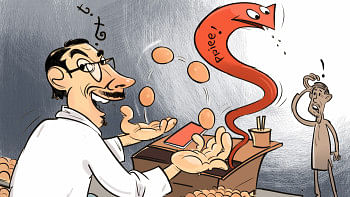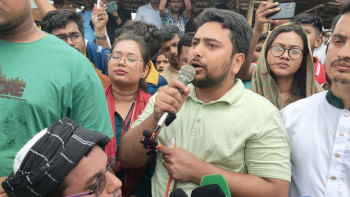Kindness gives life its biggest dividends

One of the most fundamental goals of a human being is to "find happiness." And yet it seems to be the most elusive goal of our lives. That's because happiness is subjective, as well as temporary; you can't be happy every day, all the time. But feeling joy is a more durable emotion, one that takes more effort to achieve, yet gives out huge dividends in life.
Simon Sinek, a motivational speaker from the US, explains that happiness is fleeting while joy "is an underlying part of something bigger" and so much more enduring. According to him, joy can be found in one's relationships with others as well as in how we behave in our communities. Research has found that acts of kindness can bring joy, because they release the feel-good hormone, oxytocin. What is most fascinating about this phenomenon is that an act of kindness has a multiplier effect—not only does the recipient and the giver get a shot of oxytocin each, but someone witnessing this act will get the same feeling of joy and may even be inspired to show kindness to others themselves.
The history of civilisation has shown that humans survive when they are part of a community, when there is a basic understanding that members must help each other, which provides long-term benefits to all. Yet, even such a fundamental prerequisite of existence is constantly forgotten, often with catastrophic consequences.
If we start from the smallest unit—the nuclear family, it works when everyone gives something to that unit. There is a tacit agreement that family members will come together during a crisis, share resources, make sacrifices to make sure the unit, as a whole, survives. Which is why we are so attached to our families, our parents, children, siblings, and so on. It is also why we are so negatively affected when relationships with family members turn sour and communication breaks down. No matter how much we try, it is almost impossible to just distance ourselves from that person. The family is our most valued asset and security system, and so must be preserved and protected. The same logic extends to communities, societies, nations, and the world. The more we cooperate with each other, the more we give to each other with sincerity, the kinder we are, and the more the collective benefits, both tangible and intangible.
But if it's so easy to acquire the amazing gift of joy, why are we so pathetically poor at it? This is because kindness is not dependent on how much money you have—though logically, it should make things much easier. True, there are many rich people who have donated enormous amounts of their wealth to noble causes—for scientific research to cure fatal diseases, building shelters for the homeless, funding scholarships and grants to universities for less privileged but meritorious students, building free schools, and clinics for those who cannot afford them. Most of these philanthropists, known or unknown, have made huge differences in the lives of others. No doubt, in return, these acts of generosity have given them immense joy and fulfilment. But what about others—the people worth millions of dollars? Do they give as much as they should?
In Bangladesh, the number of millionaires has increased substantially over the last few years. At the same time, income inequality has also widened. Innumerable newspaper reports have been published regarding the high costs of living, which have become unbearable for not only the poor but even those in the middle-income brackets. Dhaka itself seems to be a microcosm of the glaring gap between the rich and poor. You see swanky flats worth Tk 12 crore in high-rises overlooking dingy, overcrowded slums where hundreds of families live in squalid conditions. How much time do the residents of these luxurious homes take out of their privileged lives to think about their neighbours across the street or on the other side of the lake? Is it enough to distribute a few low-priced sharees and panjabis, or a few hundred taka to fulfil a religious obligation?
Real acts of kindness usually come from people with little means. Like the 12 friends from Daulatpur, Khulna who have been providing iftar to people at only Tk 1 per item from a small eatery owned by one of the friends who started this effort around 18 years ago. Each of them gives their time and whatever funds they can spare to provide food to people at the lowest price possible. Some of the friends are from different faiths, but that does not stop them from showing their compassion for others no matter what religion they follow. There are many such examples of generosity from individuals who are far from being affluent, but who give whatever they can—their time, money, or labour—simply because they feel fulfilled when they do something for others. What they don't realise is that each of them is part of something really wonderful—they are proponents of the healing process the world needs due to the continuous onslaughts of human cruelty and selfishness.
Of course, it is unrealistic to expect everyone to be as selfless as these extraordinary people. But kindness can come in small packages, as everyday acts. When you acknowledge the security guard of your office building with a smile or a simple inquiry about their welfare, when you allow the elderly woman to go before you in the long queue, get up to let someone sit in your place on a crowded train, or when you buy a meal for a homeless person, you may not be changing lives, but it gives value to that person which is something every individual has a right to, regardless of what status society has relegated them to. What you get in return is quite immeasurable—it is a sense of joy that no amount of self-indulgence can provide.
Aasha Mehreen Amin is joint editor at The Daily Star.


 For all latest news, follow The Daily Star's Google News channel.
For all latest news, follow The Daily Star's Google News channel. 






Comments